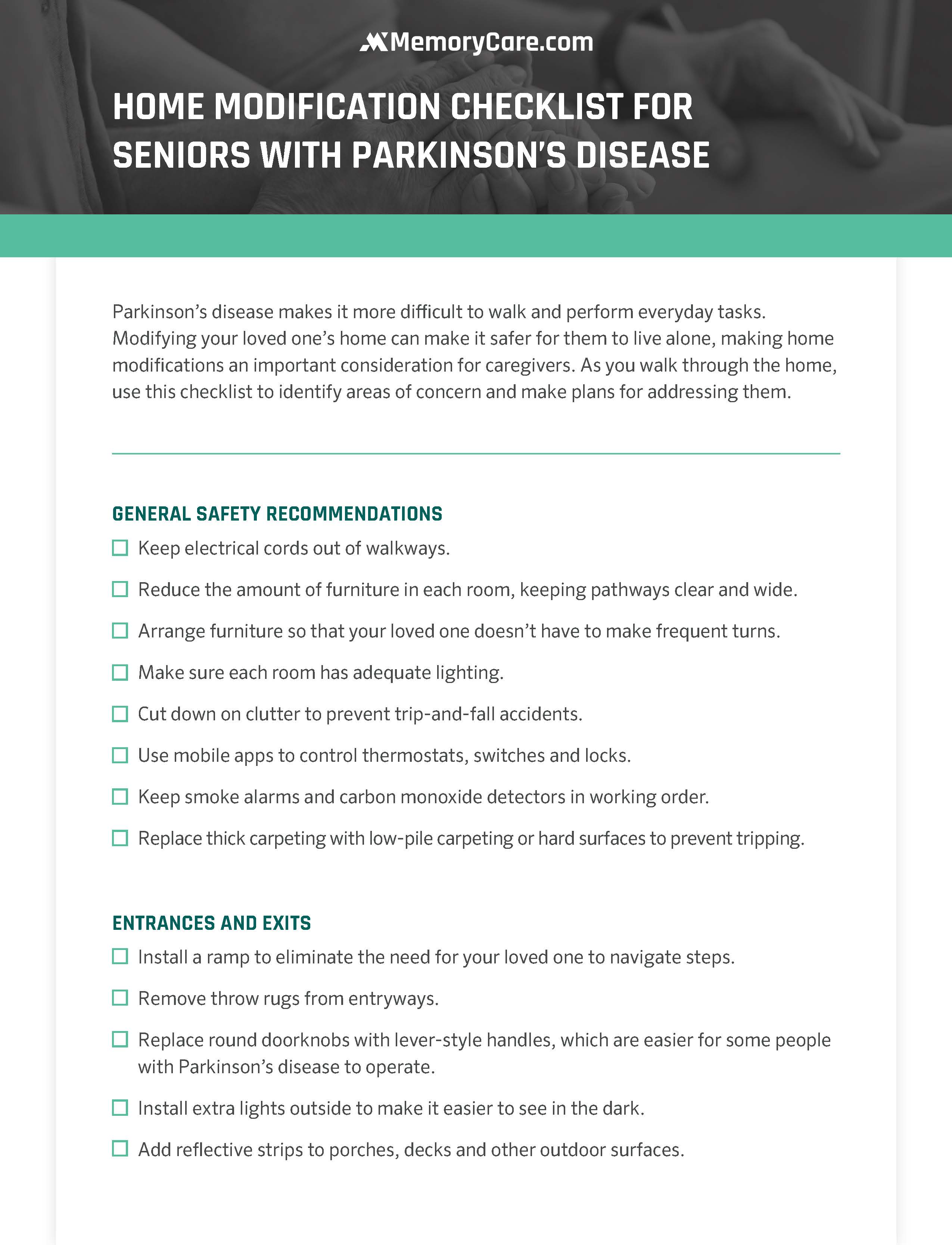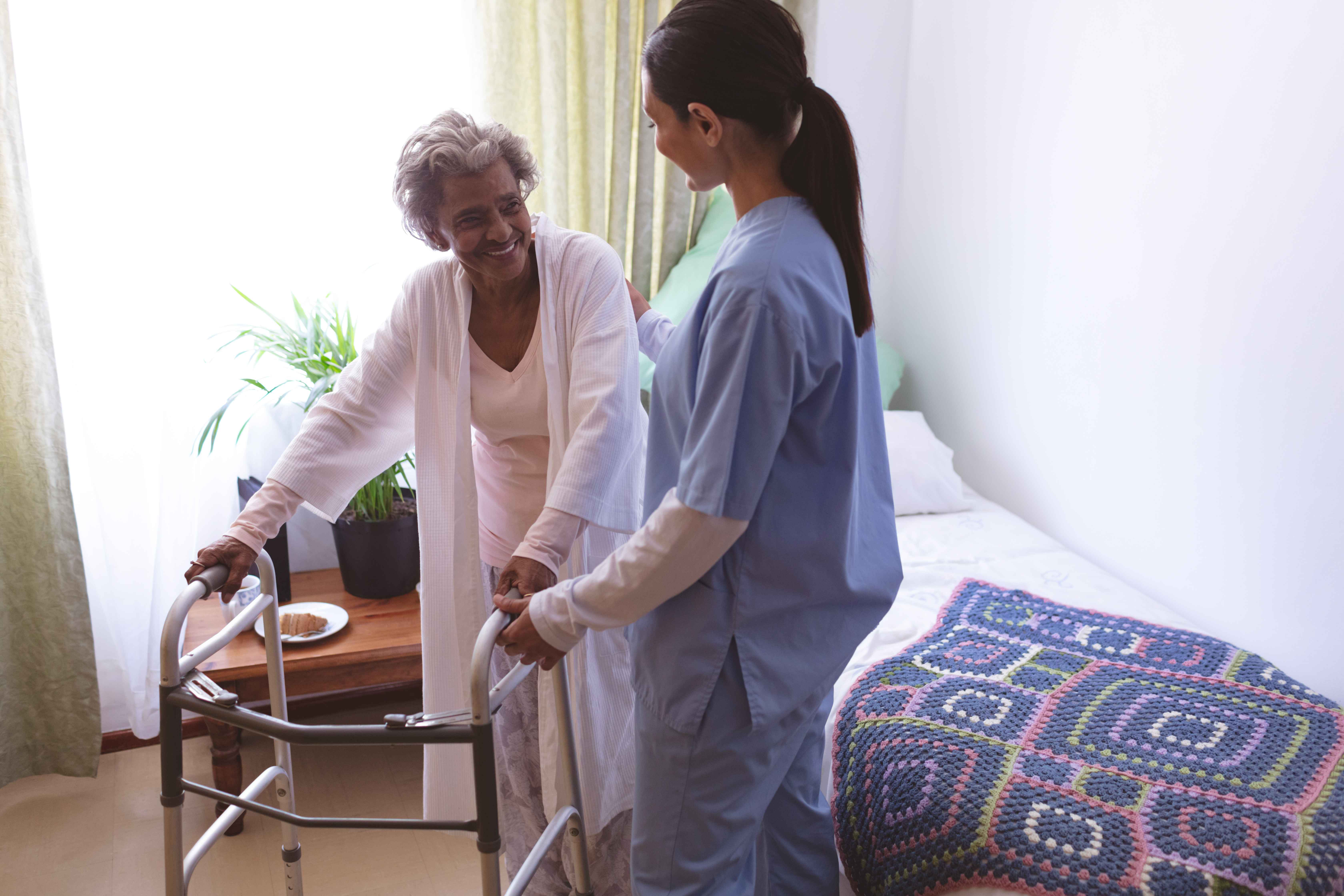
Care Guide for Seniors with Parkinson’s Disease
Review by: Deidre Sommerer
Date published: December 4, 2022
In the United States, Parkinson's disease occurs at a staggering rate. More than 1 million Americans, 89% of whom are seniors aged 65 and over, are living with this illness. While the symptoms for every person can vary, most experience significant motor impairment. That includes tremors, rigidity, balance issues and slowed movement. As the illness progresses, many also experience difficulties with speech and swallowing, as well as depression, sleep disturbances, pain, cognitive impairment and bowel or bladder incontinence.
Those who have the condition may struggle to manage their daily activities, resultingin a dire need for long-term care options. However, because Parkinson’s disease typically progresses rapidly, finding adequate care can be difficult. Seniors with Parkinson’s disease require long-term care options that provide regular needs assessments and that employ caregivers who understand signs of disease progression.
With the right care plan in place, seniors who have been diagnosed with Parkinson's disease can still enjoy a relatively high quality of life. This guide provides information about what individuals with Parkinson's should look for in a senior living community, as well as a list of facilities that serve residents with the disease. It also includes a list of resources that may help seniors and their caregivers.
Ensuring Safety in the Home for Seniors With Parkinson's Disease
Mobility issues and cognitive impairment can make it difficult for seniors with Parkinson's disease to move safely throughout their homes. Seniors who manage their Parkinson's at home should take accessibility and safety into consideration. Below are some things to consider for home safety and accessibility.
| Modifications and Accessibility Improvements | Top Safety Considerations |
|---|---|
| Grab bars | Seniors with Parkinson's disease may experience bouts of dizziness or issues with mobility. Fitting open spaces with grab bars for stabilization can help to prevent falls in the home. Add grab bars in the shower and near the toilet for stability. |
| Plumbing and countertops | Many seniors with Parkinson's disease find themselves confined to a wheelchair or struggling to stand for an extended period of time. Lowering the height of countertops and repositioning cabinets from below to above can make daily activities, such as cooking, easier to do while seated. When needed, consider an ADA sink to ensure wheelchair accessibility. Seniors who struggle to sit and stand may find it easier to use a toilet with a higher seat. Consider a walk-in tub, which is a safer choice for seniors with impaired motor skills. |
| Tripping hazards | Tripping and falling can become a huge medical event for seniors, especially if they have Parkinson's disease. Clear the house of all potential tripping hazards, including cords, rugs, misplaced furniture and plants, floor vases or baskets that may be in walking paths. Consider purchasing smaller dining furniture so there's more space to move through the kitchen without tripping or bumping into things. Clear overgrown hedges, loose stones or pavers and decor from front porches and outdoor pathways. |
| Cupboard organization | Move items that are used most often, such as spices and dishes, to lower cupboards so they're easier to reach. |
| Furniture | If possible, purchase firmer, more stable living room furniture. Soft seating can be difficult for mobility-challenged seniors to sit on and get up from. Consider a higher bed with a firm mattress. If it's in the budget, opt for an adjustable bed with rails. |
| Accessibility | Add a stair lift to safely transport seniors from floor to floor. If a wheelchair is used, hallways and doors may need to be widened to provide adequate space. |
Room-by-Room Home Modifications for Seniors With Parkinson's Disease
Home modifications are an important part of making a safe, home-based living environment for seniors with Parkinson's disease. Use the checklist below as a resource when making modifications throughout the home.

Finding a Senior Living Facility that Caters to Seniors with Parkinson's Disease

Senior living communities offer supportive services that make day-to-day life easier and more comfortable for seniors who have Parkinson's disease. However, it's important to find a facility that offers the right range of services to adequately support those who are living with this condition.
Whether you're finding a facility for yourself or a loved one, look for communities that offer the following services:
- Around-the-clock supervision: Seniors with Parkinson's may need assistance at any time of the day or night, so it's essential to choose a facility that can provide care 24 hours a day. You should also look for a facility that offers a secure environment with continuous supervision when needed, which includes constant security to prevent wandering in the event of a dementia diagnosis.
- Cognitive and memory support: Cognitive decline is common among seniors with Parkinson's disease. You'll want to find a senior living community that provides activities to support cognitive health and memory.
- Caregivers with Parkinson's experience: Parkinson's disease can be a complicated condition, and it can progress. Make sure there's a caregiver who can quickly recognize new symptoms and provide or recommend appropriate changes to the senior's care plan.
- Medication management: Most seniors with Parkinson's disease have a strict regimen when it comes to medications. Unfortunately, many also struggle with memory loss along with motor skill impairments that can make it difficult to open prescription bottles. Ensure you have access to a caregiver who can provide medication reminders and help with taking the right medications at the right times.
- Socialization: Regular socialization can help with memory and overall well-being. This can help prevent further cognitive decline alongside feelings of isolation, loneliness and depression. Senior living communities should offer opportunities for residents to socialize with caregivers and peers each day.
- On-site therapies: Therapy services help to slow progression and provide strategies for managing the physical changes of the disease. Search for a senior living community that offers these services on-site.
Senior Living Facilities That Offer Parkinson's Management and Care
While it's easy to find assisted living and memory care facilities, it's not always easy to find one that can provide the level of care needed by those with Parkinson's disease. The facilities below provide care to seniors who have Parkinson's and create individualized care plans to suit their unique needs.
| Facility Name | Location | Description |
|---|---|---|
| Parkinson's Specialty Care Residential Living - East Bloomington | Bloomington, MN | Parkinson's Specialty Care in East Bloomington is located in a quiet, serene area. It provides 24-hour care and daily activities to support cognitive preservation and growth. Other services include scheduled transportation, chef-prepared meals and physical therapy. |
| Parkinson's Specialty Care Residential Living - Edina East & West | Edina, MN | This six-person senior living community is located within a large, tastefully appointed home modified to suit those with Parkinson's disease. It features wide doors and hallways along with comfortable shared living spaces. At night, residents can retire to private bedrooms while continuing to receive attentive care and supervision from the facility's caregivers. |
| Parkinson's Specialty Care Residential Living - Golden Valley | Golden Valley, MN | This intimate facility helps seniors with Parkinson's disease navigate day-to-day tasks and enjoy a higher quality of life through customized care plans that address their unique issues. The facility features a large, fenced-in outdoor space where seniors can enjoy bird-watching and gardening. Family and friends are welcome to visit any time. |
| Parkinson's Specialty Care Residential Living - Maplewood | Maplewood, MN | Parkinson's Specialty Care in Maplewood is a small residential facility that's nestled in a quiet suburban community. It features shared spaces, including a kitchen, living room and sunroom, as well as private bedrooms for all residents. Caregivers provide medication management and help with daily tasks 24 hours a day. |
| Parkinson's Specialty Care Residential Living - West Bloomington | Bloomington, MN | The Parkinson's Specialty Care location in West Bloomington is a small facility that offers dedicated care for seniors with Parkinson's disease. It incorporates relationships with friends and family members in seniors' care plans, and its 24-hour staff oversees care to ensure the safety and health of residents. |
| Senior Care Homes - Nantucket House | Overland Park, KS | Nantucket House is staffed with caregivers who specialize in providing care for seniors with Parkinson's and other disorders that result in dementia or memory loss. The facility is small, with space for a maximum of eight residents, and features private bedrooms along with several shared living spaces. |
| Ultimate Personal Care Homes | Houston, TX | Ultimate Personal Care Homes is a network of memory care communities that accepts residents with Parkinson's disease and other forms of dementia. It offers 24-hour supervision and care, which includes medication management, as well as on-site cognitive and physical therapy services. |
| The Heritage of Overland Park | Overland Park, KS | The Heritage of Overland Park takes a holistic approach to Parkinson's care. Its care plans include nutritional planning, psychiatry, physical therapy, speech therapy and medically supervised care. Residents enjoy daily social activities, free transportation and chef-prepared meals three times a day. |
| Goddard House | Brookline, MA | Goddard House offers the Parkinson's in Motion program, which is specifically designed to give those with the disease a variety of support services. These services include individual and group therapy, medical care, speech therapy, nutritional planning and occupational therapy. |
| Fairview Rehab & Nursing Home | Queens, NY | Seniors living at Fairview Rehab & Nursing Home receive round-the-clock support, including help with toileting, eating, medications and mobility. Its staff includes multilingual nurses and caregivers to ensure everyone feels comfortable, safe and at home. |
| Saint Simeon's Senior Community | Tulsa, OK | Saint Simeon's Senior Community is a member of the American Parkinson's Disease Association. This facility is exclusive to those with Parkinson's. It provides help with daily tasks around the clock, as well as physical, speech and occupational therapy, three daily meals and socialization opportunities. |
| Booth Gardner Parkinson's Care Center | Kirkland, WA | Booth Gardner Parkinson's Care Center is a residential care facility that's staffed with Parkinson's experts. Its team offers diagnosis and treatment services, as well as personal care and other common assisted living services that help residents enjoy a higher quality of life. |
| Youville House Assisted Living | Cambridge, MA | Youville House Assisted Living's team is specially trained in providing care for seniors with Parkinson's disease. The facility features private suites and several shared amenities, including a fitness center, games room and restaurant-style dining area. Residents can participate in daily group activities and regular outings. |
| Redstone Village | Huntsville, AL | Redstone Village is a great place for seniors with Parkinson's who are concerned about the progression of their illness. It offers assisted living, memory care and skilled nursing care all provided by nurses and caregivers with training in Parkinson's care. Amenities include family dining, ample outdoor space and private suites. |
| Agape Villa Care Home | Roseville, CA | Agape Villa Care Home is an intimate assisted living facility that caters to the unique needs of seniors with Parkinson's disease and dementia. Its caregivers are on-site 24 hours a day to provide help with daily tasks, physical therapy and meals, as well as to facilitate group activities that prevent cognitive decline. |
For help finding a senior living option with specialized care for seniors with Parkinson's disease, contact a Family Advisor.
Resources for Caregivers of Seniors Living With Parkinson's Disease

| Resource Name | Contact | How it Helps |
|---|---|---|
| Alliance for Aging Elder Helpline | (305) 670-4357 | The Alliance for Aging's Elder Helpline helps seniors facing all types of issues. Those with Parkinson's can access resources such as support groups, financial assistance programs and long-term care or housing. The Elder Helpline is free and staffed by volunteers trained to provide counseling and advice to seniors in crisis. |
| American Parkinson Disease Association (APDA) | (800) 223-2732 | The APDA helps family caregivers better understand the needs of those with Parkinson's and ensures they're able to recognize new symptoms and signs of progression. The APDA also educates first responders, including police, firefighters and paramedics, to ensure they understand the signs of Parkinson's and can effectively assist those with the illness. |
| Area Agencies on Aging | (800) 677-1116 | Area Agencies on Aging are located in counties across the United States. They provide services relevant to those with Parkinson's, including resource referrals, caregiver training and benefits counseling. |
| Medline Plus | medlineplus.gov | Medline Plus is an online resource operated by the U.S. Department of Health and Human Services' National Library of Medicine. Seniors can access information about Parkinson's disease, including signs and symptoms of progression and common treatment options. Caregivers can find tips on providing help as well as download patient and caregiver handouts. |
| Melvin Weinstein Parkinson's Foundation | (757) 313-9729 | Melvin Weinstein's Parkinson's Foundation is a nonprofit organization that collects donations and provides funding to seniors who are struggling to cover medical and caregiving costs related to Parkinson's disease. Seniors who need financial assistance can apply online. |
| National Council on Aging | Submit Online Form | The National Council on Aging is a federally funded organization. It publishes handouts and documents to educate seniors with Parkinson's disease and their caregivers. The organization also features a variety of information about Medicare, Medicaid and long-term care. |
| The National Institute on Aging | (800) 222-2225 | The National Institute on Aging is a federally funded organization that hosts webinars and resources to educate seniors and their caregivers. It offers specialized information about Parkinson's and several other common conditions. Additionally, seniors can visit the National Institute on Aging to register for telehealth workshops. |
| Needy Meds | (800) 503-6897 | Need Meds is a nonprofit organization that helps low-income seniors fund the cost of necessary prescription medications. Seniors with Parkinson's disease who need several prescriptions to manage symptoms may benefit from the program's financial assistance. |
| Newly Diagnosed Kit | (800) 473-4636 | The Newly Diagnosed Kit is provided by the Parkinson's Foundation and includes several resources to help seniors navigate doctor appointments and symptom monitoring. The kit contains an info card, fact sheets and a list of questions to ask their doctors. |
| Parkinson Foundation | (301) 844-6510 | The Parkinson Foundation is a national nonprofit that provides education and raises funding for Parkinson's research. It also hosts support groups and training for caregivers, as well as free in-person and online classes to help seniors with Parkinson's strengthen muscles and delay the progression of symptoms. |
| Patient Advocate Foundation | (800) 532-5274 | The Patient Advocate Foundation works with seniors and individuals who have Parkinson's disease, advocating on their behalf to better understand benefits, such as Medicaid and Medicare. Its representatives also mediate between seniors and their caregivers, insurance providers or creditors when disputes arise. |

